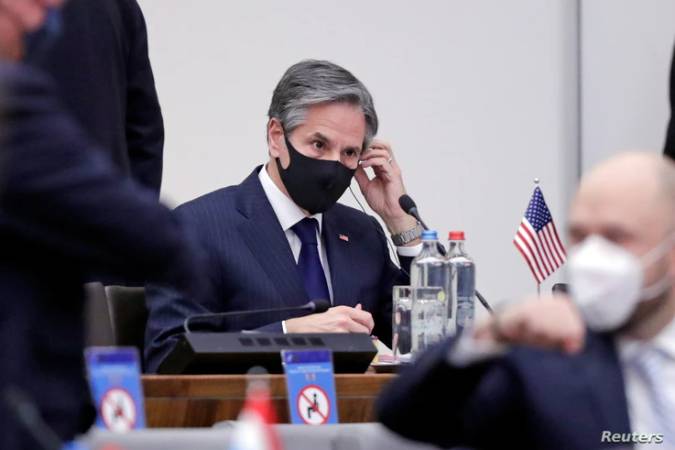LONDON - U.S. Secretary of State Antony Blinken reaffirmed the United States' commitment to NATO as he sought to strengthen the transatlantic relationship in a two-day summit this week in Brussels, which wrapped up Wednesday.
"You have our unshakeable vow: America is fully committed to NATO," Blinken said in a speech at NATO headquarters in the Belgian capital.
He promised a new relationship with European allies.
"Trust has been shaken to some degree over the past few years. So, let me be clear about what the United States can promise to our allies and partners. When our allies shoulder their fair share of the burden, they'll reasonably expect to have a fair say in making decisions," Blinken said.
He outlined the military threats facing the alliance, warning that NATO must evolve to defend democracy and the rules-based international system.
"Our shared values of democracy and human rights are being challenged — not only from outside our countries, but from within. And new threats are outpacing our efforts to build the capabilities we need to defend against them," he said.
"Beijing's military ambitions are growing by the year. Coupled with the realities of modern technology, the challenges that once seemed half a world away are no longer remote. We also see this in the new military capabilities and strategies Russia has developed to challenge our alliances and undermine the rules-based order that ensures our collective security," Blinken said.
He added that NATO must evolve to counter emerging threats, including disinformation, cyberattacks, climate change and the coronavirus pandemic.
NATO Secretary-General Jens Stoltenberg welcomed the U.S. commitment and gave further warnings of the dangers facing the alliance.
"Russia undermines and destabilizes its neighbors, including Ukraine, Georgia and the Republic of Moldova. It supports the crackdown on Belarus and tries to interfere in the Western Balkans region," Stoltenberg told reporters Wednesday. "We see that Russia continues to deploy new and destabilizing nuclear weapons. We need agreements that cover more weapons and more nations like China."
China's rise poses a relatively new challenge for NATO, analyst Simona Soare of the European Union Institute for Security Studies said.
"It's not about NATO moving into the Indo-Pacific but rather being more aware and more prepared to tackle the potential negative consequences of Chinese presence in Europe. And what this means is, of course, more awareness of foreign direct investment that could target potentially strategic technologies or critical infrastructure," Soare told VOA.
The U.S. secretary of state said Washington still expects European allies to meet the NATO defense spending target of 2% of GDP by 2024, which was a key demand of the Trump administration.
U.S. President Joe Biden is pursuing a different strategy, Soare said.
"He has also put forward a proposal that allies spend more together through NATO's common budget, and that common expenditure should go towards funding, at least in part, some of NATO's missions and operations. And this has been framed as being key to solidarity."
NATO's mission in Afghanistan also was high on the agenda, with U.S. troops set to withdraw by May 1 under a peace deal signed by the Trump administration and the Taliban in 2020. Blinken said the situation was under review, and that the U.S. would consult with NATO allies.
Despite the harmonious words from the U.S. delegation, tensions within NATO resurfaced during the summit. In a sideline meeting with his Turkish counterpart, Blinken urged Ankara to drop its purchase of a Russian S-400 air defense system. Turkey said Wednesday that the "deal is done."
Blinken also made clear U.S. opposition to the Nord Stream 2 pipeline that would bring Russian gas directly to Germany and warned that companies involved in its construction could face U.S. sanctions.
"The pipeline divides Europe. It exposes Ukraine and central Europe to Russian manipulation and coercion. It goes against Europe's own stated energy security goals," Blinken told reporters.
Following the NATO summit, Blinken also met with European Union Commission President Ursula von der Leyen and EU Foreign Policy Minister Josep Borrell. Despite the hawkish tone against China within NATO, the EU is finalizing a trade agreement with Beijing.
Blinken said Europe and the U.S. should work together on shared goals.
"We know that our allies have complex relationships with China that won't always align perfectly. But we need to navigate these challenges together. That means working with our allies to close the gaps in areas like technology and infrastructure, where Beijing is exploiting to exert coercive pressure," he said.
Borrell said Europe sees China "as a partner, as a competitor and a systemic rival."
"We agreed to launch the European Union-United States dialogue on China as a forum to discuss the full range of related challenges and opportunities. We decided to continue meetings at the senior official and expert levels on topics such as reciprocity, economic issues, resilience, human rights, security, multilateral, and areas for constructive engagement with China, such as climate change," Borrell said at a news conference Wednesday evening.
Blinken said the EU was the United States' "partner of first resort." His words have been warmly welcomed in Europe, but analysts say the true test of the new transatlantic relationship is yet to come as the alliance faces threats on multiple fronts.
(VOA)

